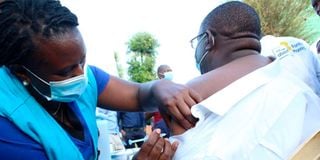Covid vaccination certificates available from Chanjo platform, PS Mochache says

Ann Boraya, a nurse, administers Covid-19 vaccine to the Covid Taskforce Chairman Willis Akhwale at Mutuini Hospital in Dagoretti South, Nairobi, on March 9, 2021.
Kenyans who have been fully vaccinated for Covid-19 will be able to travel abroad as long as they have a certificate, says the Ministry of Health.
Appearing before the National Assembly’s Health Committee yesterday, Health Principal Secretary Susan Mochache said fully vaccinated people can download their certificate from the Chanjo platform and present it to travel agencies.
“After getting your two doses, you can easily get your certificate through the platform and present it to various travelling agencies,” she said.
Asked whether the AstraZeneca vaccine being used in Kenya is effective and safe given that some European countries do not recognise it, Pharmacy and Poisons Board chief executive Dr Fred Siyoi assured the public there is nothing to worry about.
“What we are giving Kenyans is not of low quality. It has been recommended by the World Health Organization and it is being used by other countries. That is why it passed emergency authorization,” Dr Siyoi said.
The only difference between the AstraZeneca version produced by Serum Institute of India and that from Oxford is where it was produced, he said.
The ministry has been advised to reach agreements with other countries to allow Kenyans to travel unhindered.
“People are suffering a lot. Most of our African residents are being barred from travelling to other countries because the vaccines that we are currently using are considered not so effective,” said Seme MP James Nyikal.
Ms Mochache assured Kenyans that talks are underway at high levels to resolve the issue of travel restrictions.
“This is not just about Kenya alone but we are aware that most people are affected. We are in talks to ensure that the issue is resolved as fast as possible,” she said.
Though the Serum Institute’s version of the AstraZeneca vaccine provides full protection, the European Union does not recognise it.
The vaccine is being rolled out in Kenya and other African countries under the EU-supported Covax facility.
The European Medicines Agency (EMA), which evaluates and supervises medicinal products, has approved only four Covid-19 vaccines: Comirnaty (Pfizer/BioNTech), Moderna, Vaxzervria (Oxford AstraZeneca), Janssen (Johnson & Johnson).
But Covishield, the Indian version of the AstraZeneca and University of Oxford vaccine, is yet to be recognised by EMA for the European market, though the WHO has endorsed it for emergency use across the world.
The EU recently issued guidelines on the applicability of the EU Digital Covid Certificate “Green Pass” to different Covid-19 vaccines that would facilitate free and safe movement across EU states and associated countries.
But African countries and EU countries supported by Covax will not benefit from the free movement certificate, because it applies only to vaccines that have received EU-wide marketing authorisation.
While the AstraZeneca vaccine produced and authorised in Europe (Vaxzervria) is included, Covishield, produced under licence by the Serum Institute, is excluded.
Ms Mochache was also asked to explain the basis for allowing planes and trains to carry passengers to full capacity and not matatus and buses.
Unlike road transport, she said, air flow in trains and air planes is well controlled to ensure safety.
“Rail and air transport have controlled air suction systems that continuously filter fresh air into the cabin, unlike road transport,” she said.
She also noted that trains and planes screen passengers more thoroughly, especially temperature and hand sanitising at several points before boarding.
That, she said, eliminates the entry of suspected Covid-19 cases into the cabins and keeps passengers safe.





